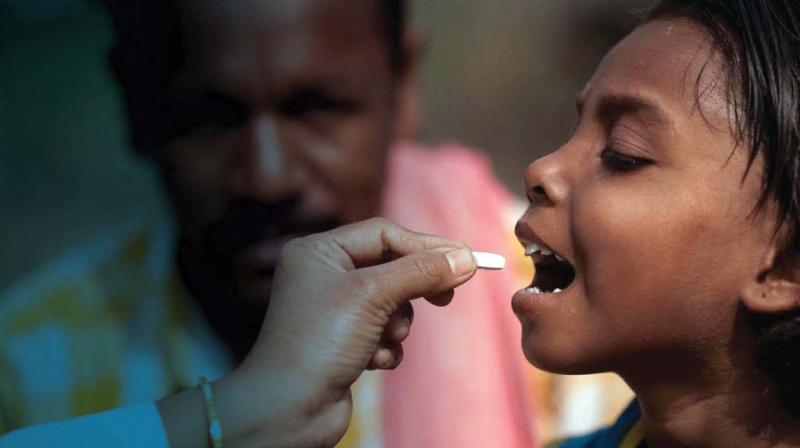Bengaluru: Private schools told to fall in line, administer de-worming pills

Bengaluru: As the Department of Public Instruction (DPI) is all set to observe the National De-worming Day (NDD) on September 25 to prevent intestinal worm infections among schoolchildren, the DPI Commissioner has directed all heads of Education Department to make it a big success by covering students even in private unaided schools this year.
DPI Commissioner Dr K.G. Jagadeesh has issued orders to all Deputy Directors of Public Instruction (DDPIs) of all the 34 educational districts to make it a success. He also held a teleconference with all the heads at his office on September 13.
Though Karnataka started the programme in 2015 following directions from the Union Health Ministry and World Health Organisation (WHO), penetrating private schools has been difficult.
As many as 1.2 crore children are studying in 78,000 primary and highschools in the state. Of them, 42 percent are studying in 36,000 private aided and unaided schools.
Forty-nine percent of children under the age of 14 are suffering from Soil Transmitted Helminths (STH) related infections and 1.6 crore children are being covered under the National Deworming Campaign since its launch in 2015 in Karnataka, according to the State Health and Family Welfare Department.
Though NDD was successfully conducted in government-run schools, the DPI has been facing a challenge in convincing authorities at private unaided schools over the last five years.
The DPI has received reports that the principals of these private schools hesitate to administer the tablet to kids on school premises fearing complaints from parents as majority of them don’t have confidence in the government health drive. Many families give de-worming medicine to kids in consultation with local pediatricians and several schools never encourage children another dose fearing it may be more than required.
“In the February 10 National De-worming Drive, majority of private schools failed to give de-worming tablets to their children. The department has been advising all private schools to support the government initiative this year,” the commissioner said.
Officials said that the regular treatment to worm infections contributes to good health and nutrition to children of school age, which in turn leads to increased enrollment and attendance.
The central government had launched the initiative with the intention to deworm children between the ages of 1 and 19 at schools, junior colleges and anganawadis since 2015 following directions from the World Health Organisation as India has the highest number of Soil Transmitted Helminths (STH) and majority of 22 crore children are under the risk of worm infections in the country.
Twenty-four percent of the world population also suffers from worm infections. Seven in 10 children between six months and 5 years are found to be anaemic in rural areas, the National Family Health Survey revealed. Children at the age of one or two years are given half a tablet of Albendazole (400 mg) to chew and one tablet of 400 mg will be given for children above 2 years. The tablet is safe and has very few side-effects with like nausea, vomiting, dizziness, diarrhoea and passes quickly. STH or parasitic worms are among the most common infections worldwide. It lives in human intestines and consumes nutrients meant for human body. They produce thousands of eggs every day which are passed in feces and spread to others through public toilets.
The Department has decided combat this health problem with education and sensitisation of students about proper hygiene like washing hands and other precautions, the officials said.

